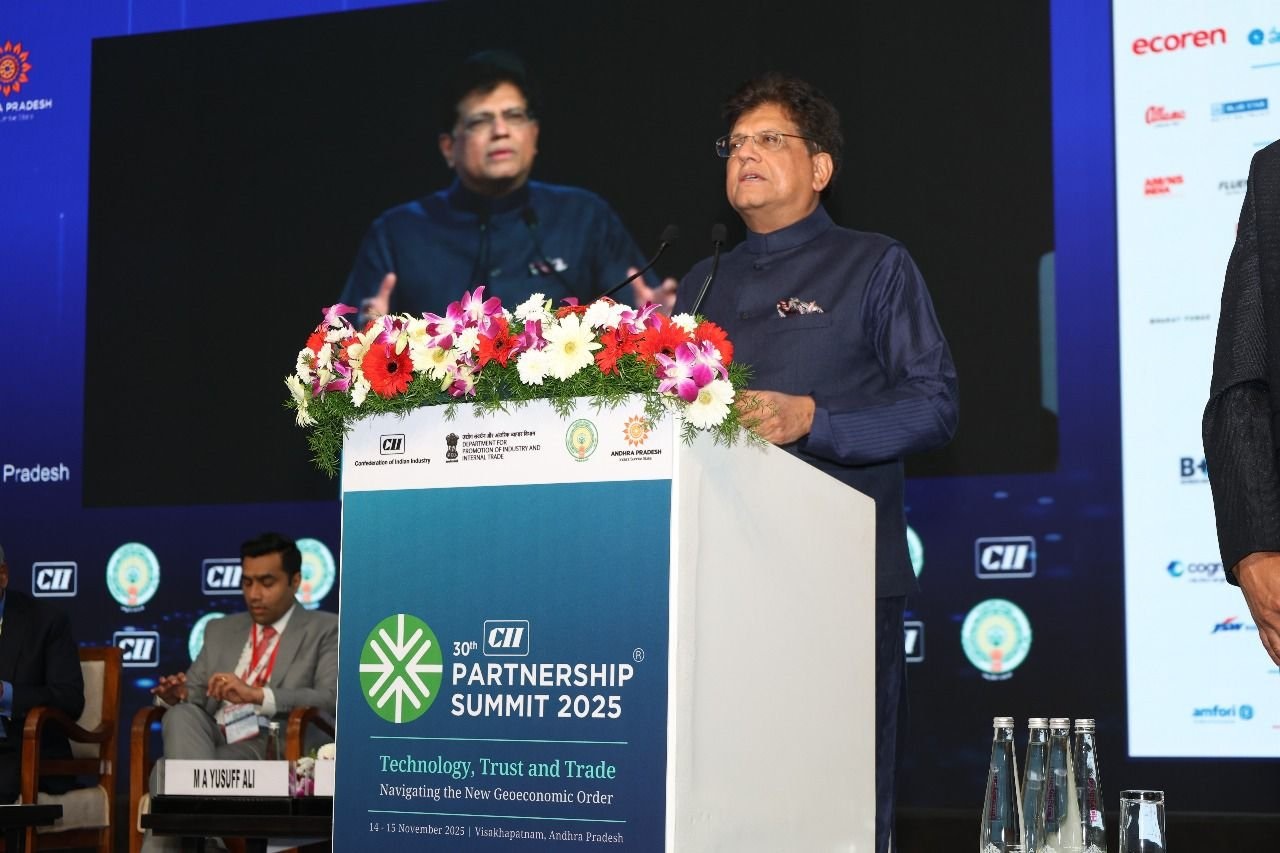Outlines three-pillar framework to guide India’s journey to Viksit Bharat by 2047.
NEW DELHI: Union Minister of Commerce and Industry Piyush Goyal expressed that Visakhapatnam region today stands as a gateway to global trade — ranging from steel manufacturing to the emerging semiconductor ecosystem and seafood exports at the 30th CII Partnership Summit 2025 organized in Visakhapatnam, Andhra Pradesh.
Goyal further said that India’s holistic development journey under the leadership of Prime Minister Narendra Modi is firmly moving towards the goal of Viksit Bharat by 2047. He stated that a developed and prosperous India will ensure that every state flourishes, every citizen enjoys a high quality of life, and every child born in Andhra Pradesh has a bright and secure future.
The Minister presented a three-pillar framework inspired by Chanakya’s Arthashastra to guide India’s journey towards becoming a developed nation by 2047.
The first pillar, Prosperity through Technology, reflects India’s digital and innovation-led growth. Goyal said that India’s technology story is one of democratization, scale and speed, driven by talent and skill. He mentioned that India has built a world-class digital public infrastructure serving 1.74 billion citizens, with several countries expressing interest in adopting India’s UPI real-time payment system. Aadhar has provided every Indian with a secure digital identity, while India is building a comprehensive semiconductor ecosystem with current investments of $30 billion and growing. The India AI Mission, he said, is democratizing artificial intelligence for all. One billion Indians are now connected to the Internet, making India the second-largest user base of ChatGPT globally.
From launching the Mars Mission to deploying 104 satellites in one mission, India has demonstrated its capabilities in innovation and scale. Goyal added that India has achieved an installed power capacity of 500 GW, with more than 51 per cent coming from renewable energy sources. The country plans to double clean energy capacity to 500 GW within the next five years, marking one of the fastest energy transitions globally.
He said that India offers its international partners not just markets but also collaborations for shared prosperity and mutual growth. India’s digital infrastructure, vibrant ecosystem and engineering talent provide a strong launchpad for globally scalable solutions.
The second pillar, Trust through Righteousness, highlights India’s increasing stature as a trusted global partner. Goyal said that in the current geo-economic landscape, trust is the most valuable currency. India’s humanitarian efforts, including the free supply of COVID-19 vaccines and medicines to over 100 countries, have strengthened its global credibility.
He noted that India’s trust-based diplomacy is reflected in its expanding network of Free Trade Agreements (FTAs). He mentioned the recently signed FTA with the United Kingdom and the operationalized FTA with the European Free Trade Association (EFTA) bloc, which includes commitments of $100 billion in FDI and the creation of one million direct jobs. India has also signed FTAs with the UAE, Australia and Mauritius and is currently negotiating with the EU, the United States, Oman, New Zealand, Chile and Peru.
The Minister said that India’s credibility stems from predictability through regulatory reforms, transparency through digital governance and reliability in honoring commitments. He highlighted that India has removed more than 42,000 compliances and abolished 1,500 obsolete laws. He added that next-generation GST reforms are further improving ease of doing business and expanding consumer spending. “When you partner with India, you partner with a civilization that views relationships through Dharma—doing what is right,” he said.
The third pillar, Trade through Capability, underscores India’s growing global competitiveness. Goyal said that India’s trade exports reached a record $825 billion last year despite global headwinds, while FDI inflows touched $81 billion—reflecting strong investor confidence. This growth, he said, is driven by the Make in India initiative, market diversification and movement up the value chain through technology investments. He recalled the words of economist Michael Porter, “National prosperity is created, not inherited,” and said that India’s economic growth embodies this principle.
Goyal proposed three key recommendations to expand global partnerships: facilitating two-way investments by lowering trade barriers and enabling freer movement of goods, services and capital; strengthening technology cooperation through co-development of frontier technologies and investment in high-impact innovation; and building trust through transparent governance and predictable policy frameworks that support long-term collaboration.


